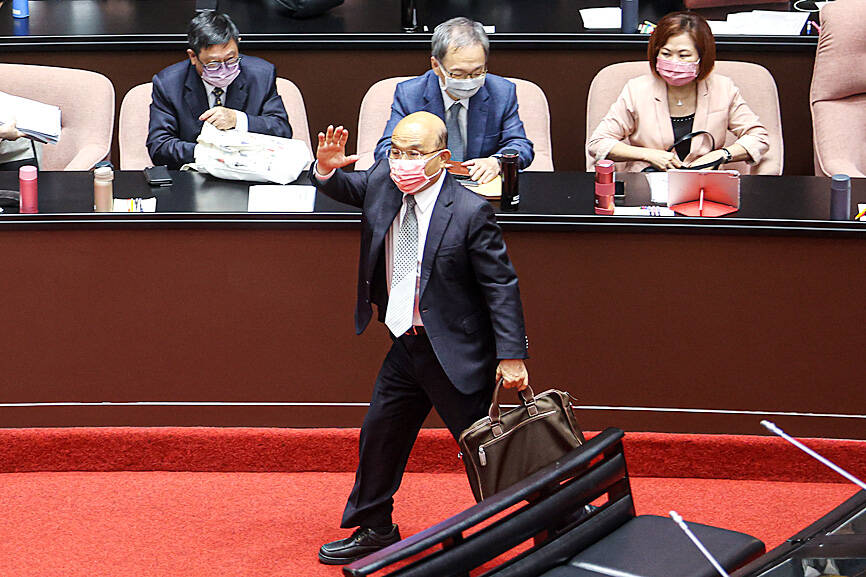Government agencies plan to bolster cross-departmental efforts to target criminal activities at their source, Premier Su Tseng-chang (蘇貞昌) told legislators after New Power Party (NPP) Legislator Chiu Hsien-chih (邱顯智) expressed concern that Taiwanese laws are too conservative in dealing with cryptocurrencies.
The Global Anti-Scam Organization and victims of cryptocurrency scams have criticized Taiwan’s prosecutors and law enforcement officials for being reluctant to contact cryptocurrency exchange platforms for assistance, Chiu said.
Chiu commended the government’s efforts in fighting recent Cambodia-based fraud rings, but said that more must be done to enable law enforcement agencies to freeze cryptocurrency transactions, which is a primary method of transferring funds for illicit activities.

Photo: Reuters
The Criminal Investigation Bureau is waiting until this month to file its first-ever request to freeze cryptocurrency transactions, while other countries can already take such measures, Chiu said.
The bureau reasons that there is no legal basis or precedent for taking such action, he said.
Regarding the assets the bureau is looking to freeze, the cryptocurrency exchanges are based offshore and the electronic wallets are not owned by Taiwanese, creating problems in jurisdiction and making notices difficult to deliver, Chiu said, citing bureau officials.

Photo: CNA
However, the journal Criminal Policies and Crime Prevention in December last year said that transactions using blockchain technology are transparent at every level, and it is possible to track down the recipient of the funds, he said.
Cryptocurrency exchanges have demonstrated a willingness to work with law enforcement, Chiu said, citing the example of Binance, the exchange with the world’s largest daily trading volume, which has established a search-and-assist system used by law enforcement agencies.
Binance’s system supports traditional Chinese language searches, he added.
Taiwan’s law enforcement agencies have shown less commitment than cryptocurrency agents in tackling fraud, Chiu said.
Minister of Justice Tsai Ching-hsiang (蔡清祥) said that the High Prosecutors’ Office is collaborating with cryptocurrency exchanges, and can access transaction data.
The Ministry of Justice operates a staff education program that involves overseas training, which would aid prosecutors.
Su said that the government is striving to ensure that criminal cryptocurrency activity is controlled and regulated.

MORE VISITORS: The Tourism Administration said that it is seeing positive prospects in its efforts to expand the tourism market in North America and Europe Taiwan has been ranked as the cheapest place in the world to travel to this year, based on a list recommended by NerdWallet. The San Francisco-based personal finance company said that Taiwan topped the list of 16 nations it chose for budget travelers because US tourists do not need visas and travelers can easily have a good meal for less than US$10. A bus ride in Taipei costs just under US$0.50, while subway rides start at US$0.60, the firm said, adding that public transportation in Taiwan is easy to navigate. The firm also called Taiwan a “food lover’s paradise,” citing inexpensive breakfast stalls

TRADE: A mandatory declaration of origin for manufactured goods bound for the US is to take effect on May 7 to block China from exploiting Taiwan’s trade channels All products manufactured in Taiwan and exported to the US must include a signed declaration of origin starting on May 7, the Bureau of Foreign Trade announced yesterday. US President Donald Trump on April 2 imposed a 32 percent tariff on imports from Taiwan, but one week later announced a 90-day pause on its implementation. However, a universal 10 percent tariff was immediately applied to most imports from around the world. On April 12, the Trump administration further exempted computers, smartphones and semiconductors from the new tariffs. In response, President William Lai’s (賴清德) administration has introduced a series of countermeasures to support affected

CROSS-STRAIT: The vast majority of Taiwanese support maintaining the ‘status quo,’ while concern is rising about Beijing’s influence operations More than eight out of 10 Taiwanese reject Beijing’s “one country, two systems” framework for cross-strait relations, according to a survey released by the Mainland Affairs Council (MAC) on Thursday. The MAC’s latest quarterly survey found that 84.4 percent of respondents opposed Beijing’s “one country, two systems” formula for handling cross-strait relations — a figure consistent with past polling. Over the past three years, opposition to the framework has remained high, ranging from a low of 83.6 percent in April 2023 to a peak of 89.6 percent in April last year. In the most recent poll, 82.5 percent also rejected China’s

PLUGGING HOLES: The amendments would bring the legislation in line with systems found in other countries such as Japan and the US, Legislator Chen Kuan-ting said Democratic Progressive Party (DPP) Legislator Chen Kuan-ting (陳冠廷) has proposed amending national security legislation amid a spate of espionage cases. Potential gaps in security vetting procedures for personnel with access to sensitive information prompted him to propose the amendments, which would introduce changes to Article 14 of the Classified National Security Information Protection Act (國家機密保護法), Chen said yesterday. The proposal, which aims to enhance interagency vetting procedures and reduce the risk of classified information leaks, would establish a comprehensive security clearance system in Taiwan, he said. The amendment would require character and loyalty checks for civil servants and intelligence personnel prior to